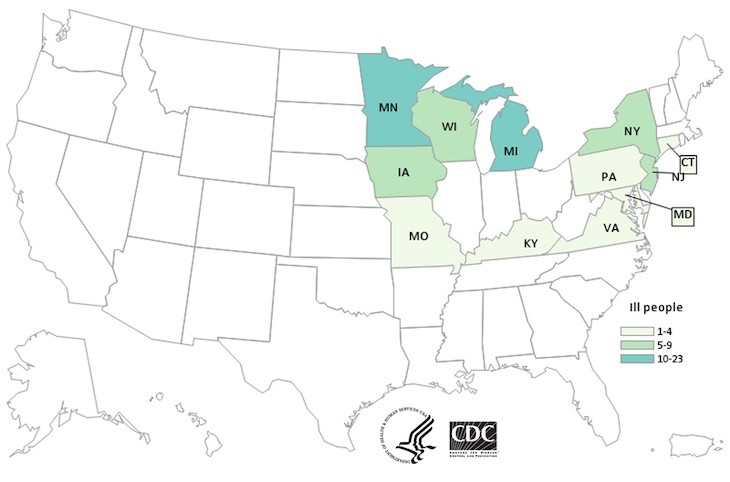The Salmonella enteritidis peach outbreak has now grown to include 78 people in 12 states, according to an update by the Centers for Disease Control and Prevention (CDC). Twenty-three people have been hospitalized because they are so ill. The outbreak has been linked to recalled Prima Wawona and Wawona Packing peaches and some products made with those peaches.

Ten more ill people and three new states, Connecticut, Kentucky, and Missouri, have been added to the outbreak totals. The case count by state is: Connecticut (1), Iowa (8), Kentucky (1), Maryland (1), Michigan (17), Minnesota (23), Missouri (1), New Jersey (7), New York (9), Pennsylvania (2), Virginia (3), and Wisconsin (5). Illness onset dates range from June 29, 2020 to August 3, 2020.
Of 67 patients who provided information to officials, 23 have been hospitalized, which is a hospitalization rate of 35%, very high for a Salmonella outbreak. The typical hospitalization rate for this illness is 20%. That may mean that this strain is more virulent, or that the product is contaminated with a lot of the pathogen.
Epidemiologic evidence indicates that peaches are a likely source of this outbreak. The FDA is investigating to see if any other retailers may have sold the contaminated peaches, or if another supplier is involved. Of 45 people who gave information to investigators, 38, or 84%, said they ate fresh peaches the week before they got sick. Most of these people bought loose or bulk peaches.
Many recalls have been issued for Wawona peaches. They may have been sold at ALDI, Food Lion, Hannaford, Kroger, City Market, Fry’s, Food 4 Less, Foods Co., Jay-C, King Soopers, Ralphs, Smiths, Russ Davis Wholesale, Target, Walmart, and Wegmans. Other retailers may also have sold the peaches.
The bulk loose peaches were usually sold in bins for individual selection. They may have stickers with these PLU numbers: 4037, 4038, 4044, 4401, 94037, 94038, 94044, 94401. But not all peaches with these specific PLU (price look up) numbers were supplied by Prima Wawona.

If you or a loved one has been diagnosed with food poisoning, you can contact attorney Fred Pritzker for help by calling 1-888-377-8900 or 612-338-0202.
Noted food safety lawyer Fred Pritzker, who has filed many lawsuits on behalf of patients sickened with Salmonella, said, “No one should get sick, let alone be hospitalized, just because they wanted to eat a fresh peach for lunch. Processors and packers have to do a better job to ensure that the products they sell don’t make people sick.”
Check your refrigerator or pantry to see if you have purchased any of these recalled peaches or products made with them. If you have, or if you aren’t sure, throw them away even if some or part have been consumed and no one has gotten sick.
The symptoms of Salmonella food poisoning include a fever, nausea, vomiting, abdominal pain and cramps, stomach pain and cramps, and diarrhea that may be bloody. If you have been ill with these symptoms, see your doctor. You could be part of this Salmonella Enteritidis peach outbreak.

If you or a loved one have been sickened with a Salmonella enteritidis infection after eating recalled Wawona peaches or peach products, please contact our experienced attorneys for help at 1-888-377-8900 or 612-338-0202.




